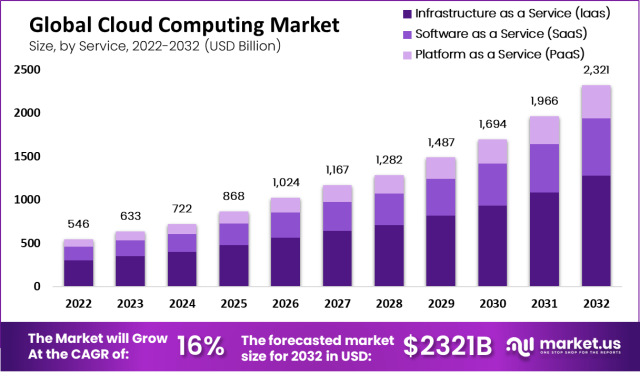Cloud computing is no longer just a fashionable trend – is a rapidly developing global industry with a marker value forecast to reach $2,495.2 billion by 2032.
There are countless reasons why the cloud is becoming popular with businesses. Some organizations are moving backup storage to the cloud. Others are using cloud solutions to organize a backup site so that they can continue working in the event of a failure of the main infrastructure. This option is used not only by SMBs, but also by large corporations. If your business is seasonal, the cloud is a great option for peak periods, when demand is high or there is a sales period.

Below are six of the most relevant reasons why cloud computing is important for business in 2024 and beyond.
Cost-effectiveness
The biggest benefit of cloud computing is that it can significantly reduce costs. For example, if you are building an on-premises infrastructure, you spend a lot of money on servers, power, configuration and management. Not only do you have to pay for servers, but you also need a dedicated space to house them, electricity, and specialists to configure and manage them.
Cloud servers are much cheaper to run than your own data center. This is because the costs of utilities, maintenance and so on are the responsibility of a provider.
At the same time, the customer only pays once a month or once a year for what they really need. For example, if you need storage, you can pay for gigabytes rather than the price of a whole server.
Enhanced security
Cloud providers have strict security, compliance and data protection standards. Nevertheless, data security remains one of the top concerns that business leaders have about cloud computing.
In fact, major providers develop advanced security protocols and follow strict regulatory requirements. In addition, the level of security in data centers is much higher than in in-house facilities.
To ensure application and data integrity, highly regulated industries such as government and healthcare must follow industry-specific compliance requirements. Almost all of the top organizations in these industries are users of cloud computing services.
High reliability
Service Level Agreement (SLA) are one of the key indicators that customers focus on. This is why providers regularly update their systems, constantly monitor threats, make backups and have redundant systems in case of power outages.
Innovation and competitive advantage
The use of cloud enables companies to quickly adopt new technologies and services, to stay ahead of the competition and to drive innovation in their industries.
Flexibility and scalability
Cloud computing allows you to support business growth without making costly investments in IT infrastructure. This is perhaps the most important benefit. You can easily increase or decrease the amount of computing resources as needed with just a few clicks. For example, most providers have the option to increase the amount of resources to meet growing business needs. With an on-premises infrastructure, you would have to buy additional hardware.
What type of Cloud Services Should Your Business Use?
There are many ways to use the cloud in business, below are just a few of the most popular and in-demand ones.
Data Storage
The cloud can serve as your organization’s primary data storage solution. Cloud storage reduces the need to keep data on site. In addition, this is ideal for collaboration – people from different locations can access files and work together.
Data Backup
Cloud backup involves creating a copy of your data on a remote server. A provider charges a fee based on capacity, number of users, or bandwidth. The service is necessary to restore system operations in the event of a problem. For example, if a DDoS attack disrupts server operations.




